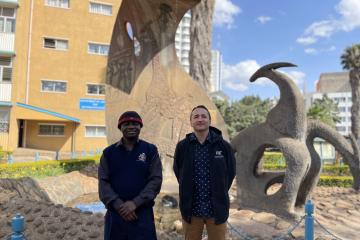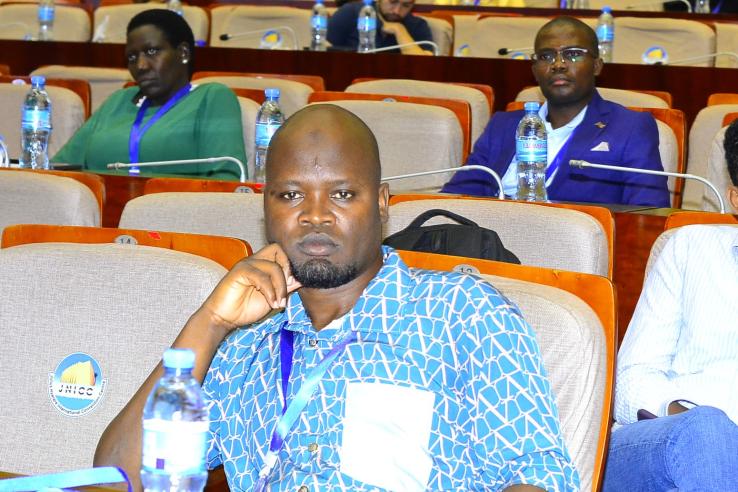
African Scholar Spotlight: Abdul-Basit Tampuli Abukari

This post is part of our ongoing series showcasing the work and perspectives of economists from the African continent who are leading randomized evaluations. Through our African Scholars Program, we hope to help create more opportunities for African researchers to advance the research agenda on the continent through randomized evaluations.
In this spotlight, we speak with Abdul-Basit Tampuli Abukari, Senior Lecturer in the Department of Agricultural and Food Economics at the University for Development Studies.
What drew you into the field of development economics and, in particular, working with impact evaluations?
Economics has been my passion since senior high school, and it became a path I pursued in my undergraduate studies at the Kwame Nkrumah University of Science and Technology in Ghana. It was during this time that my interest in development economics emerged.
After serving for a year as a Teaching Assistant in the Department of Economics, and motivated by my interest in development, I pursued an MSc in Development Management at the University of Agder, Norway, through the Norwegian Government scholarship. Upon completion, I joined the Council for Scientific and Industrial Research – Savanna Agricultural Research Institute (CSIR-SARI), where I became familiar with the developmental challenges faced by rural communities in Northern Ghana, most of whom depend on farming for their livelihoods.
Given the close relationship between development economics and agricultural economics, I pursued a PhD in Agricultural Economics at Çukurova University in Turkey, supported by a Turkish Government scholarship.
Northern Ghana has become a hub for governmental and non-governmental actors implementing various interventions to alleviate poverty, due to the many developmental challenges in the region. My proximity to these rural communities gave me firsthand experience of how ineffective and sometimes misplaced these interventions were, especially those related to agriculture. This fuelled my motivation to focus on impact evaluation, with the hope that interventions grounded in evidence would be easier to implement, more cost-effective, and more likely to achieve meaningful results for the people they aim to support.
In my current position as a Senior Lecturer in the Department of Agricultural and Food Economics at the University for Development Studies, it is not a coincidence that I teach Agricultural Development and Policy at both an undergraduate and postgraduate level.
What are your broad research interests?
My broad research interests lie in agricultural production economics and the assessment of how policies and interventions affect farmer and community welfare. This includes examining outcomes such as productivity, food security, climate change resilience, health, and education. I approach these topics at both the micro and macro levels, recognizing that together they form the building blocks of broader development—shaping not only the lives of individual farmers and households, but also the growth and progress of communities and the nation as a whole.
What are you using initiative funds to do? What research question are you trying to answer and how does it relate to your context?
I have had the opportunity to work on three J-PAL-funded projects:
- Digitalization of Cocoa Value Chain Payments in Ghana, a proposal development grant (PDG) funded by the Digital Identification and Finance Initiative in Africa (DigiFI).
- Improving Livestock Production Through Tracking Devices in Northern Ghana, a PDG funded by the Digital Agricultural Innovations and Services Initiative (DAISI).
- Efficiency of digital agricultural services by Cowtribe in Ghana, a pilot grant funded by DAISI.
The first project explored the digital payment systems available to cocoa farmers in light of persistent delays in payments for their cocoa beans, which negatively affect both their livelihoods and agricultural productivity. The existing cash-based payment system also exposed farmers to insecurity and theft. Our team examined electronic payment systems as a potential solution, focusing on mobile money, e-zwich, and bank transfers. While mobile money emerged as the most convenient option, at the time, the electronic levy (e-levy) charged on transactions was a major disincentive, followed closely by unstable telecommunications networks.
The second project investigated the use of electronic tracking devices to address the challenges of extensive livestock production, which is common in low-resource settings. In these settings, animals roam over large areas to graze and find water, often without close daily supervision. While it allows farmers to avoid the costs of housing and feeding animals intensively, it is associated with challenges such as poor animal health (due to stress, dehydration, and disease), increased theft, and occasional communal clashes. We explored livestock tracking as a possible intervention to address these challenges. The study found Radio-frequency identification (RFID) technology and GPS-enabled neck collars as the main livestock tracking technologies used. RFID devices can be worn as neck collars or inserted as rumen boluses, and work within a limited range, while GPS-enabled collars can track animals anywhere but consume more battery power. However, none of the companies were expanding their operations due to high operational costs, which affected their profitability. On the demand side, farmers wanted the technology at a much more affordable price than companies were able to offer. Therefore, we found that the intervention faced cost-related challenges on both the supply and demand sides, making it difficult to scale up.
The third project—a pilot study, examined access to veterinary services among livestock farmers in Northern Ghana. In Ghana, access to extension services is limited, and veterinary services are even scarcer, with a veterinarian-to-livestock ratio of roughly 1:900,000, which is among the highest in Africa. Many farmers in some districts have never received government veterinary care. Given the critical role of veterinary services in animal health, food security, and meat quality, this gap represents a serious constraint for rural farmers. Cowtribe, a private-sector initiative, has leveraged technology to fill this gap—delivering veterinary services more widely, quickly, and at lower cost. Our study found that farmers accessed veterinary information through voice notes, phone calls, and text messages—channels that proved fast and widely accessible. For services requiring medicine or vaccines, Cowtribe delivered through partner agro-veterinary dealers or drones for hard-to-reach areas, especially during the rainy season. These deliveries were timely, affordable, and effective. Overall, early-stage results indicate that participants in the Cowtribe intervention accessed veterinary services six times more often than non-participants, with greater emphasis on prevention than treatment, shorter delivery times, higher vaccination rates, larger livestock holdings, and lower mortality rates. Aside from veterinarian charges, all other costs associated with veterinary access were lower for participants.
What do you see as the big unanswered research questions in your context that RCTs may be able to help answer? Does this relate to any projects you are excited to work on in the future?
One of my most pressing unanswered questions is understanding the factors that influence the adoption of digital innovations among farmers, and how these innovations impact multiple outcomes across the entire agricultural value chain. Often, these digital solutions come bundled—affecting not just production, but also processing, marketing, and more. For example, digital tools like those offered by Cowtribe and Anitrack extend beyond livestock production to influence many parts of the value chain.
Another important question is why indigenous technologies and traditional processes have not been fully digitalized. Rather than developing entirely new digital innovations, why not focus on digitizing existing and trusted traditional practices? No matter how innovative a digital solution may be, farmers’ familiarity with and trust in it will play a major role in whether they adopt it. For instance, community savings groups like the Village Savings and Loan Association (VSLA), traditional intermediaries that facilitate microfinance services like Susu collectors, and family farm management systems could potentially be digitized to improve reach and efficiency.
While there are many other research questions I’m interested in, I believe randomized controlled trials (RCTs) can be powerful tools to uncover answers to these challenges.
How has the support you have received from J-PAL to date assisted you in your career? How can organizations like J-PAL continue to build on the support they provide to local researchers in running randomized evaluations?
From my perspective, J-PAL’s support can be grouped into three main areas: research funding, supporting scholars to attend conferences, summits, and training, and creating networking opportunities for scholars. All three have been vital to my growth as an academic.
The research funding has allowed me to explore questions I would not have been able to pursue otherwise. J-PAL’s competitive calls for proposals have challenged me to design and defend globally competitive research projects. Even in cases where my proposals were not selected, the process was valuable—each time, I received an unbiased, blinded academic review that strengthened my future applications. These experiences have made me more competitive not only in J-PAL’s calls but in other funding applications. I am now in the process of publishing manuscripts based on J-PAL-funded research.
J-PAL has also provided me with opportunities to attend summits and training events, both to share my research findings and to build my skills in impact evaluation. With support from CEGA, I presented in July 2024 at the Africa Evidence Summit in Dar es Salaam, Tanzania, on my DAISI-funded project. I also participated in J-PAL’s Evaluating Social Programs training at the Development Impact West Africa (DIWA) Center at GIMPA, Ghana, in August 2024.
Networking has been another key benefit. J-PAL facilitates connections with project mentors, international academics, and practitioners during workshops, summits, and training sessions. These interactions have expanded my professional network and contributed to my confidence in grant writing, teaching, and supervising students.
Looking ahead, I believe J-PAL could further support local researchers by extending the duration of their competitive initiatives and enabling scholars like myself to mentor younger researchers, particularly at the postgraduate and undergraduate levels.
Do you have advice to offer other young aspiring African scholars thinking about a career in economic research?
My advice to aspiring young African students interested in a career in economic research is to obtain a strong grounding in both microeconomic and macroeconomic theory, supported by mathematical skills. With this foundation and dedication, you’ll be well-equipped to tackle conceptual challenges in economic research and compete successfully for research funding.
What advice would you give to scholars who are considering applying to J-PAL for funding?
Research ideas should be innovative and grounded in the potential to address real developmental challenges in developing countries. Given the competitive nature of J-PAL and other research funding opportunities, rejection should not lead to frustration. Instead, feedback should be embraced as a learning tool to refine proposals for the next opportunity.
What are some of the key mistakes you made in your early applications?
I used to believe that I couldn’t compete for funding opportunities until I advanced further in my academic career, and that I needed a “Professor” or someone “internationally recognized” to apply with me. This misconception held me back until I realized that funders like J-PAL evaluate proposals on merit. It is a competition of ideas and innovativeness, and with a solid background in economics and confidence in your work, your proposal can be competitive.
What surprised you the most about how the funding process works?
I no longer find the outcomes of funding applications surprising, as I have come to see them as competitions of ideas—often with competitors I will never know. Because I cannot gauge the potential of others’ proposals, I focus less on the results themselves and more on the reviewer comments. In the past, some of this feedback caught me off guard. Over time, however, I have learned that, much like in academic manuscript reviews, reviewers may interpret the same idea differently depending on their perspective and communication style.

